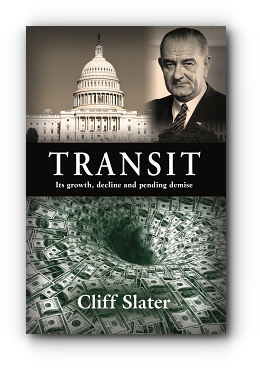| ||||||||||||||||
| Category: Politics:Corruption |
(requires Adobe Reader)
|
| About the Book | |
|
Cliff Slater spent 30 years fighting rail transit projects. Needing to know more than his opponents about transit, he gained a different view of what caused it to accrue two trillion dollars in subsidies since 1975, versus none before then. Rail transit in America was initially the product of innovative private enterprise. But by 1960, rail transit was almost wholly publicly owned and heavily subsidized. The nationís 1,150 transit bus systems were still largely private and profitable in 1960, but by 1983, municipal governments had taken over the entire transit bus industry. Despite the subsidies, there has been a marked deterioration in the condition of the nationís transit infrastructure. The American Society of Civil Engineers tells us that: ďa backlog of $176 billion for transit investments has emerged and is expected to grow to nearly $250 billion through 2029.Ē This book explains to students and others what our municipal, state, and federal governments have been changing, especially during the last 60 years, to bring us to this point. If we can understand how it happened, we can intelligently discuss what needs remedying. This book is also the story of what happens when a private industry is socialized and unharnessed from the disciplines of the marketplace. Originally, Americaís transit systems earned their incomes by satisfying the needs of their customers, whereas transit today is about adjusting to the agendas of bureaucrats, politicians, and special interest groups. The socialization of the transit industry resulted from the Urban Mass Transportation Act of 1964 and its subsequent amendments. Little was written about the academics and politicians who opposed the act, and how correctly they forecast the outcome for transit. This book tells their story. The book also tells how President John F. Kennedy in 1962 defined what transit needed in new legislation, and how the Urban Mass Transportation Act of 1964 that President Lyndon Baines Johnson signed was the antithesis of Kennedy's recommendations and set the stage for a public-transit takeover. The final action was President Richard Nixon's surprising 1970 political effort that resulted in $10 billion in funding for the 1964 Act. When the transit data from the period known as the Great Inflation, 1965 to 1982, is adjusted for inflation, we see a different picture of what happened compared to the conventional history. This then is the story about the rise and decline of transit in the U.S from 1831 to today. We also discuss possible futures for transit. We examine private sector successes such as the Atlantic City Jitney Association, profitable for over 100 years, Uber and Lyft in the modern era; the potential impact of autonomous vehicles; and the long-term effects of the COVID pandemic. We discuss why the impact of all this on transit, as we know it, is likely to lead to its demise.
|
|
| Reviews | |
ďA tour de force. Itís the best explanation Iíve seen of what did and did not happen in urban America leading up to the government takeover of mass transit. A great piece of work." ďTruly outstanding. I learned a great deal about the industry that Iíve been working in for over four decades.Ē "An interesting, factually reasoned summary of public transit over time. I can't wait for it to be published so that practitioners and students in civil engineering and urban planning can benefit from the rich presentation of transit types of service and costs; and use it as a base for their projects and research on existing and novel transit systems."
|
|
| About the Author | |
 |
Cliff Slater is a businessman who led the opposition to the imposition of a heavy rail line in Honolulu as being environmentally and economically inappropriate. The knowledge gained from this and further study in the U.S. and overseas led in time to this book. |

